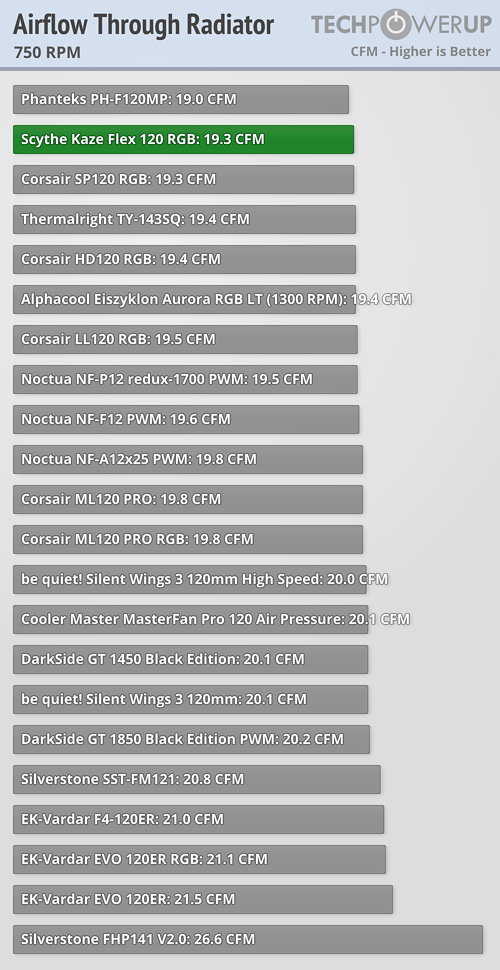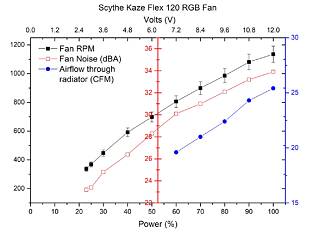 2
2
Scythe Kaze Flex 120 RGB PWM Fan Review
Value & Conclusion »Performance Testing
Please refer to the dedicated test setup page here as it applies to this review as well and I did not want to go over it separately to save on review space.As per usual, I hooked up the fan to my trusted Aquaero, set it to PWM mode, and started mapping fan RPM as a function of the PWM duty cycle. It was immediately apparent that something was off, however. The Scythe Kaze Flex 120 RGB PWM fan behaved quite erratically to where even going from 100% PWM to 99% PWM resulted in a massive RPM drop. This continued until ~95% PWM duty cycle, following which things settled down and changed slowly. But that is still going from an average of 1135 RPM to 485 RPM in the first 5% (for three test samples). I saw something similar with the be quiet! Silent Wings 3 PWM fans, and that ended up being an issue wherein be quiet! opted not to stick to the current Intel PWM spec to increase compatibility with motherboard fan control that—according to be quiet!—was still using an older spec with a different pull-up current. Indeed, I tried out two different motherboards for fan control and had the same issue, so it is not my Aquaero alone. For what it is worth, voltage control did seem to be working as expected, but voltage control on a PWM motor is not recommended.
This began a long back and forth with Scythe, including a visit to their facilities in Taiwan where they showed me how they test their fans using some motherboards and a power supply. The very fans I had tested different there, but they did not have the same controller or motherboards I had. They then sent over two fans with an updated motor based on our discussions and previous findings, and as seen above, these worked way better. Scythe says they do not plan to update all their fans to this spec given they maintain this issue is mostly with older motherboards, but given I also saw the same issue with an Intel Z270 chipset motherboard from a popular motherboard maker, I beg to disagree. Given these new samples are not going to be indicative of the retail fans, I used voltage control with the older fans for the rest of the tests.
Let's remind ourselves that the fan is rated for 300 to 1200 (+/- 10%) RPM, presumably in PWM mode. We saw above how that went, and the fan in voltage mode went from an average of 1135 RPM at 12 V to 336 RPM at 2.75 V before shutting down. All three original test samples restarted at 3–3.1 V, and the RPM range of operation was close enough to the rated specs to be permissible, especially given the different mode of control! Sample-to-sample variation was minimal as well, which is good to see.
Context is needed to talk more about the fan's performance and noise, so I have below comparison charts for some fans tested so far at set RPM values (or as near as they can get to those).




I have included fans in charts where the rated RPM is within 50 RPM of the chart cutoff point, which means that some fans are in specific charts only if their rated speed is over 50 RPM off from a threshold value (Corsair SP120 RGB, for example), or they simply do not slow down enough (NB-eLoop B12-4, for example). Similarly, the specific RPM values chosen reflect usage scenarios most popular with watercooling even though some fans (the Noctua NF-A12x25, for instance) go higher. The charts are to be considered for comparison within this result set only and are not to be compared with results from another test elsewhere owing to different testing conditions.
This is likely the last time you will see the Scythe Kaze Flex and a few other fans in the comparison list, as this fan in particular only manages to make it onto the 2/4 tested RPM ranges. Even so, it does not tell a good story for the fan when tested in a relatively high airflow restriction use case, such as the radiator I use for fan reviews. The Kaze Flex 120 RGB is just not good enough, with other fans being as quiet or even quieter and yet performing better at the same time. Even the recently tested Alphacool Eiszyklon Aurora LT RGB, which did not impress then, looks better here by comparison.
Mar 10th, 2025 16:24 EDT
change timezone
Latest GPU Drivers
New Forum Posts
- Fix for Vram always at maximum (0)
- Maxsun RX580 graphics card crashes (25)
- DLSS as antialiasing? (19)
- Please I need help with the poor performance that my PC is giving me (28)
- Company of Heroes 3 (5)
- The TPU Darkroom - Digital SLR and Photography Club (4071)
- A Final Fantasy IX Reminiscence - My love letter and homage to one of the best stories ever told (72)
- Gaming PC instabiliity (20)
- Msi 5090 DOA? (27)
- 3D Printer Club (447)
Popular Reviews
- Sapphire Radeon RX 9070 XT Nitro+ Review - Beating NVIDIA
- XFX Radeon RX 9070 XT Mercury OC Magnetic Air Review
- ASUS Radeon RX 9070 TUF OC Review
- MSI MAG B850 Tomahawk Max Wi-Fi Review
- NVIDIA GeForce RTX 5080 Founders Edition Review
- NVIDIA GeForce RTX 5070 Founders Edition Review
- Corsair Vengeance RGB CUDIMM DDR5-8800 48 GB CL42 Review
- AMD Ryzen 7 9800X3D Review - The Best Gaming Processor
- ASUS GeForce RTX 5070 Ti TUF OC Review
- MSI GeForce RTX 5070 Ti Gaming Trio OC+ Review
Controversial News Posts
- NVIDIA GeForce RTX 50 Cards Spotted with Missing ROPs, NVIDIA Confirms the Issue, Multiple Vendors Affected (513)
- AMD Plans Aggressive Price Competition with Radeon RX 9000 Series (277)
- AMD Radeon RX 9070 and 9070 XT Listed On Amazon - One Buyer Snags a Unit (261)
- AMD RDNA 4 and Radeon RX 9070 Series Unveiled: $549 & $599 (260)
- AMD Mentions Sub-$700 Pricing for Radeon RX 9070 GPU Series, Looks Like NV Minus $50 Again (248)
- NVIDIA Investigates GeForce RTX 50 Series "Blackwell" Black Screen and BSOD Issues (244)
- AMD Radeon RX 9070 and 9070 XT Official Performance Metrics Leaked, +42% 4K Performance Over Radeon RX 7900 GRE (195)
- AMD Radeon RX 9070-series Pricing Leaks Courtesy of MicroCenter (158)


